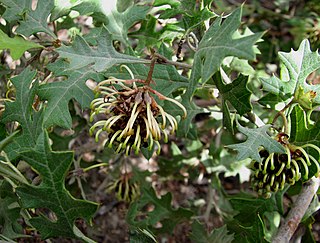
Grevillea dryophylla, also known as Goldfields grevillea, is a species of flowering plant in the family Proteaceae and is endemic to Victoria, Australia. It is a spreading to erect shrub with hairy branchlets, lobed leaves, and green to brown or yellow flowers.

Grevillea microstegia, commonly known as Mount Cassell grevillea, is a species of flowering plant in the family Proteaceae and is endemic to Victoria in Australia. It is a prostrate to low-lying or straggling shrub with deeply divided leaves, the end lobes triangular, and toothbrush-shaped clusters of reddish-brown flowers with a red style.

Grevillea steiglitziana, also known as Brisbane Range grevillea, Brisbane Ranges grevillea or Steiglitz grevillea, is a species of flowering plant in the family Proteaceae and is endemic to Victoria, Australia. It is a low, spreading shrub with pinnatifid to pinnatipartite leaves, and greenish-brown flowers with a red style.

Grevillea obtecta, commonly known as Fryerstown grevillea, Elphinstone grevillea or Taradale grevillea, is a species of flowering plant in the family Proteaceae and is endemic to Victoria in Australia. It is a prostrate, clumping or straggling shrub with pinnatifid, pinnatipartite or toothed leaves, and toothbrush-like clusters of light green to yellowish and purplish to black flowers with a dull yellow to pink style.

Grevillea venusta, commonly known as Byfield spider flower, is species of flowering plant in the family Proteaceae and is endemic to a small region of central eastern Queensland. It is an erect shrub with simple and/or divided leaves, the leaves or lobes narrowly oblong to narrowly elliptic, and clusters of green and yellow flowers with a deep maroon to purplish black style covered with white hairs.

Grevillea infecunda, commonly known as Anglesea grevillea, is a species of flowering plant in the family Proteaceae and is endemic to a restricted area of southern Victoria in Australia. It is a low-lying to weakly erect shrub with divided leaves with three to sixteen lobes or teeth and greenish-yellow flowers with a dull pink style.

Grevillea celata, commonly known as Nowa Nowa grevillea or Colquhoun grevillea, is a species of flowering plant in the family Proteaceae and is endemic to a restricted part of Victoria in Australia. It is an erect and open to low, dense shrub with oblong, broadly elliptic or linear leaves, and red and yellow, or red, white and apricot-coloured, sometimes all yellow flowers.
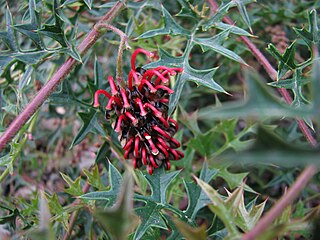
Grevillea montis-cole, commonly known as Mount Cole grevillea, is a species of flowering plant in the family Proteaceae and is endemic to central-western Victoria, Australia. It is a shrub with divided leaves with 5 to 15 lobes, the end lobes more or less triangular to narrowly oblong and sharply-pointed, and clusters of greenish to fawn and dull purplish flowers.

Grevillea bedggoodiana, commonly known as Enfield grevillea, is a species of flowering plant in the family Proteaceae and is endemic to a restricted area near Ballarat in Victoria, Australia. It is a prostrate to low-lying shrub with coarsely serrated, egg-shaped to oblong leaves and green and pink flowers.

Grevillea repens, the creeping grevillea, is a species of flowering plant in the family Proteaceae and is endemic to Victoria, Australia. It is a prostrate, often mat-forming shrub, that has leaves with 5 to 19 teeth or lobes, and light green or grey, toothbrush-like flowers with reddish striations and a deep red, or dull orange to yellow style.
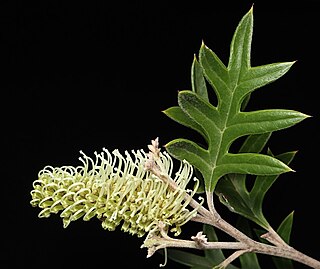
Grevillea willisii, commonly known as Omeo grevillea or rock grevillea, is species of flowering plant in the family Proteaceae, and is endemic to the eastern highlands of Victoria, Australia. It is a spreading to erect shrub with pinnatipartite leaves, the end lobes broadly triangular to oblong and sometimes sharply pointed, and dense clusters of greenish-white to fawn-coloured flowers with a white to cream-coloured style.
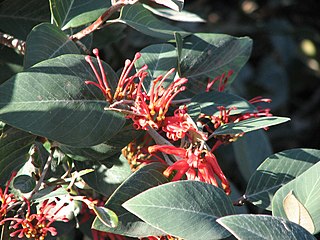
Grevillea burrowa, commonly known as Burrowa grevillea, is a species of flowering plant in the family Proteaceae and is endemic to a restricted area of Victoria, Australia. It is a spreading shrub with oblong to egg-shaped leaves, and clusters of reddish-pink flowers.

Grevillea pachylostyla, commonly known as Buchan River grevillea, is a species of flowering plant in the family Proteaceae and is endemic to Victoria in Australia. It is a mounded to almost prostrate shrub with divided leaves, the end lobes triangular, and usually down-curved, more or less toothbrush-like clusters of cream-coloured flowers that turn` pink to red after opening.

Grevillea ilicifolia, commonly known as holly grevillea or holly bush, is a species of flowering plant in the family Proteaceae and is endemic to southern continental Australia. It is a spreading to prostrate shrub with holly-like leaves with sharply-pointed triangular to egg-shaped teeth or lobes, and clusters of green to cream-coloured and mauve flowers with a pink to red style.

Grevillea polychroma , commonly known as Tullach Ard grevillea, is a species of flowering plant in the family Proteaceae and is endemic to eastern Victoria. It is a spreading to erect shrub with densely hairy branchlets, egg-shaped leaves, the narrower end towards the base, and down-turned clusters of hairy, cream-coloured, pale yellow or pink to red flowers.

Grevillea callichlaena, commonly known as Mt. Benambra grevillea, is a species of flowering plant in the family Proteaceae and is endemic to a restricted part of Victoria in Australia. It is a spreading shrub with elliptic, egg-shaped or broadly lance-shaped leaves, and uniformly red flowers.

Grevillea plurijuga is a species of flowering plant in the family Proteaceae and is endemic to southern Western Australia. It is a prostrate to low-lying or dense mounded to erect shrub with divided leaves with linear lobes and loose clusters of hairy, red or pink flowers.

Grevillea nana, commonly known as dwarf grevillea, is a species of flowering plant in the family Proteaceae and is endemic to the south-west of Western Australia. It is a prostrate to low, mounded, dense shrub with divided leaves with sharply-pointed, linear lobes, and clusters of pink, orange, yellow or red flowers.
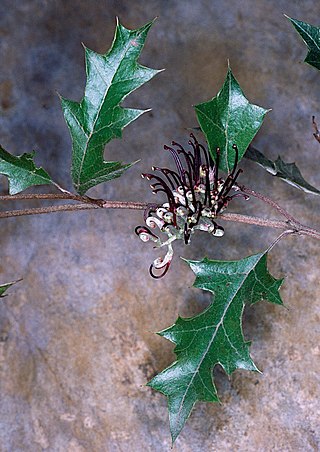
Grevillea scortechinii, commonly known as black grevillea, is a species of flowering plant in the family Proteaceae and is endemic to eastern Australia. It is a prostrate to sprawling shrub with serrated to pinnatifid leaves, the end lobes broadly triangular and often sharply-pointed, and clusters of brown flowers with a dark purplish-black style. There are two subspecies, subsp. scortechinii found in Queensland and subsp. sarmentosa, found in New South Wales.

Grevillea rara, also known as the rare grevillea, is a species of flowering plant in the family Proteaceae and is endemic to a restricted part of the South West region of Western Australia. It is a prostrate, sprawling shrub when young, later a dense, prickly shrub with pinnatisect leaves with linear lobes, and clusters of white to pale pink flowers.






















